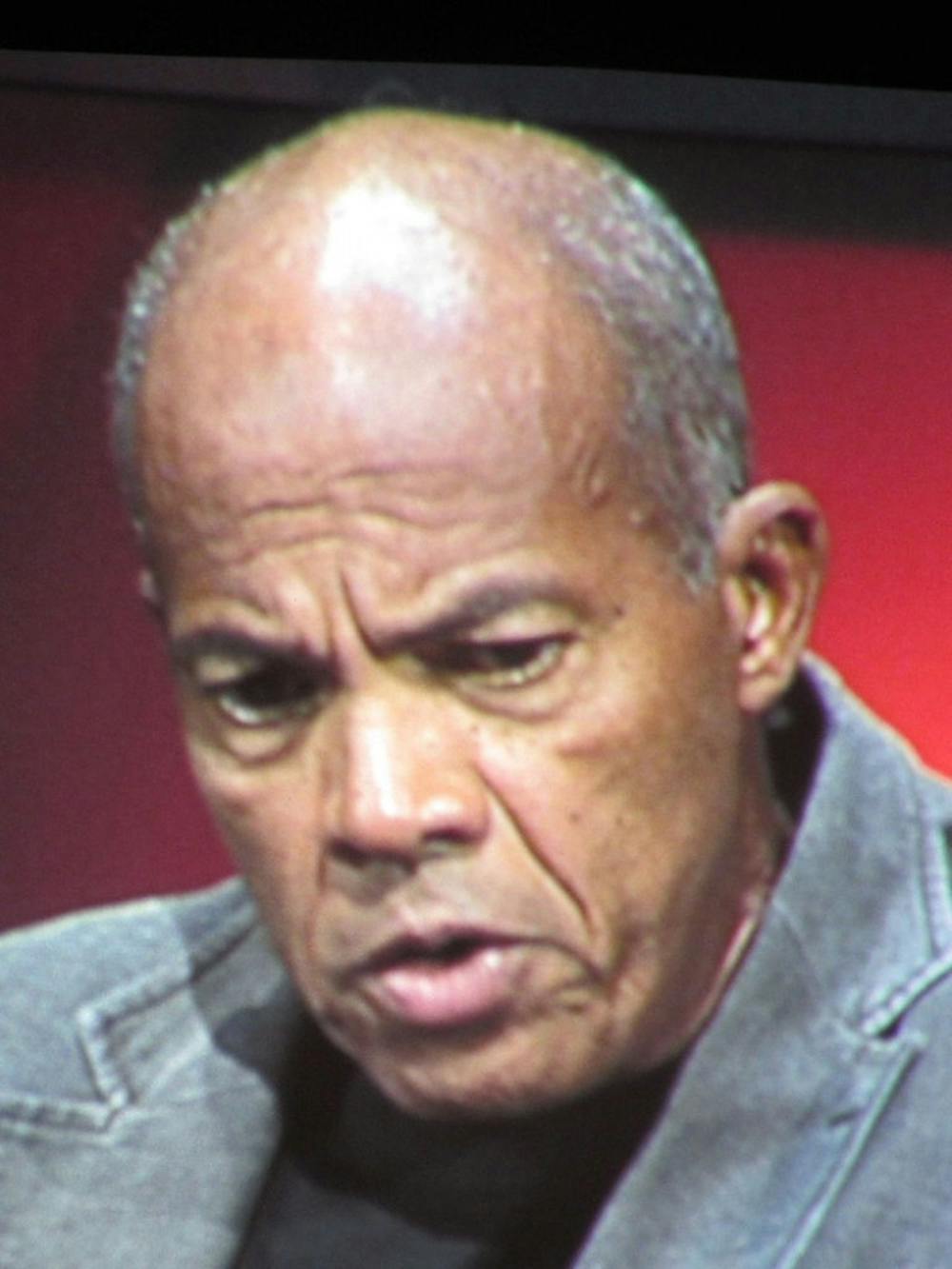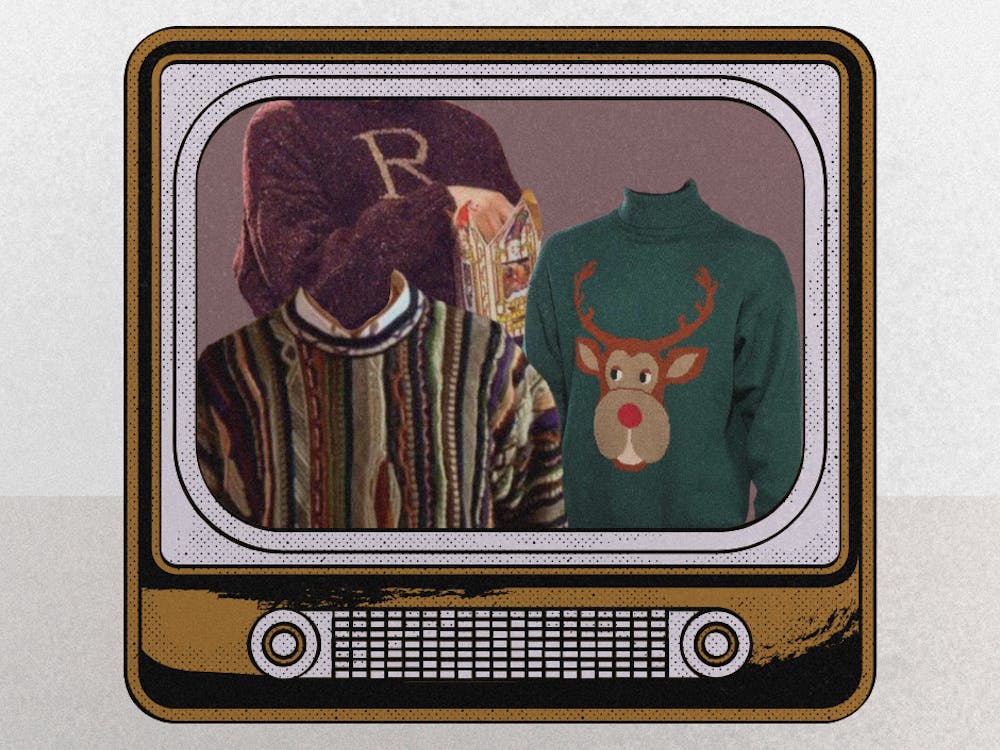“For Wideman, the process is the point … this writing is agility itself.”
There are many ways to describe the writing of John Edgar Wideman, but this quote from Master of Fine Arts student Piers Gelly — part of an introduction for the man himself — perhaps sums up his style most neatly. All one has to do is read a story by the author to realize that this is not average contemporary fiction — in some cases, it is hardly even recognizable as fiction. The prose jumps from place to place, with wildly different styles, voices and structures. Wideman’s writing is not just experimental — it is itself a continual experiment, a test to see how far the boundaries of prose can be pushed.
Wideman hosted a reading in the Albert and Shirley Small Special Collections Auditorium Wednesday evening, and the presentation was just as dense, unusual and powerful as the man’s most celebrated fiction.
The modest, almost cozy auditorium was treated to a full crowd of faculty and students, a notable emphasis on the latter.
“Wow — all these young faces!” Wideman said when he finally took the stage.
Wideman gave his reading an optimistic preface, an encouragement of sorts to many aspiring writers in the crowd.
“I have one wish for all of you … that each of you find something that makes you excited,” he said.
Wideman’s introduction soon took a more dissatisfied, bitter tone as he addressed what he knew about Virginia. It also gained a political air, one which would carry over into the reading itself.
“I know that all hell broke loose here,” he said, in reference to the rallies of Aug. 11 and 12. “I know that Thomas Jefferson built Monticello somewhere in Virginia.”
Wideman said that he was “outraged” by what he described as Jefferson’s “fine line” that set him apart from his slaves, citing different places in Monticello where he had seen evidence of such a distinction.
“I still dislike that place, whatever else it is,” he said.
He spoke a little more about Virginia, mentioning that his grandfather was born and raised in Culpeper, and then prepared to begin his reading.
There was an interesting dichotomy between Wideman’s nature when he was speaking off-book and when he was reading from his chosen passage. He seemed to embody two different personas. The former was quiet, mild-mannered, in keeping with the simple black shirt and reading glasses he wore — if not meek, then at least soberly humble.
This side of his personality was exemplified in what he said right before his reading began.
“When you get tired of listening, just duck your head and go,” Wideman said.
The second persona was explosive, and what he had just said was rendered irrelevant. Once he began reading, there was no chance of losing a single audience member. While before, students had been straining forward in their seats to catch all of Wideman’s words, during the reading it was impossible to miss a syllable. Wideman’s voice boomed forth, imbued with an angry passion.
He had a right to be angry. The chosen reading, described by Wideman as a “letter,” detailed injustice and violence of all sorts, much of it racial and much of it close to home for the author.
Cleveland was a main subject of the piece — particularly, the hateful and meaningless violence that plagued the city. Wideman name-dropped Kimberly Black, Ariel Castro and Anthony Sowell — the “Cleveland Strangler” — multiple times, describing in gruesome detail the various crimes they had committed.
He emphasized that it is “not only strangers dying on the news … but people that I believe I love.” He also described a “hovering cloud of god-awful stink,” an embodiment of the horrible acts he was depicting.
Wideman’s presentation had the feel of a political speech without any clear message, a fierce tirade that commanded attention but provided no solution for the problems described.
“I’m not going to read something to entertain you,” he had warned earlier, and this proved to be true. “Entertained” was not the right word to describe any of the audience members during this experience. “Entranced” or “captivated” would have come closer to doing it justice, though even these fall short.
From Cleveland, he moved on to several other subjects. A distinct feature of Wideman’s work is that a piece rarely tackles just one topic, and this was also true of Wednesday’s passage.
He described an email exchange between himself and a pizza shop owner, who had been subjected to violence at the hands of Wideman’s brother Oliver. He gave an account of his wife’s sleeping habits. He spoke of the files of his work archived at Harvard University.
The closing portion of this passage took on a different focus — Wideman’s reasons for writing. He admitted to using an unnatural and needlessly complex vocabulary in earlier works, explaining that he wanted to disguise his “colored voice.”
“As if by writing those words, I could bury my face — bury my people’s faces,” Wideman said.
After laying out multiple complicated ideas and social issues, Wideman finished by saying he did not have the words to sufficiently explain them. “Where are these words?” he asked. “Who owns them?”
The applause that followed the close of his speech was tremendous. Wideman stood silent, expressionless, through it all. When he spoke again, the former persona — that of the subdued, low-volume scholar — had returned.
“It’s not easy to read,” Wideman said — and indeed, the passage had seemed to take a physical toll on him. He was even quieter than before. “I think it was easier to write.”
Wideman had time to accept a few questions from the crowd. The first came from near the back of the auditorium, asking the author to explain the difference between himself and the criminal people about which he writes.
Wideman was quick in answering, though the response was a little startling.
“I think there is no difference,” he said. “I’m writing about … all of us — you.”
With this, he pointed to the person in the audience who had asked the question, and a little of the fiery passion shone through again.
Though the questions themselves were few, Wideman found many tangents to wander through — again, mirroring his adventurous, inexplicable writing style. He criticized the greediness he sees in the Trump administration, about the concept of race — a “totally useless word” — and even about his unusual punctuation.
From all this, Wideman had a few truly poignant moments. Perhaps the most moving was this summation of his goals as a writer, one of his last statements before leaving the stage.
“The one legacy I hope I’ve left behind is a sense of owning the language,” he said. “It isn’t just the language, it’s my language.”
Wideman certainly owned the language he used in his incredible reading Wednesday, just as he owned the attention of every member of the audience. The author’s words rang — and continue to ring — disturbingly true. Even as he was giving his passionate, furious speech, another “cloud of god-awful stink” had begun to descend on a Florida high school — just another example of the senseless violence that inundates Wideman’s writing.
“I’m trying to write about power,” Wideman said at one point during the presentation. Parse away the odd structures, the unorthodox punctuation and the interesting stylistic choices, and a basic, fundamental theme of power can be found — the ways in which it is distributed, how easily it can be abused and how often it seems that the wrong people wield all the power.
It works on a metafictional level, as well — Wideman’s prose itself has considerable power, and here is one man, at least, who deserves such a gift. He seems to be conscious of this power and knows exactly how to use it. Read any of his writing for proof.







